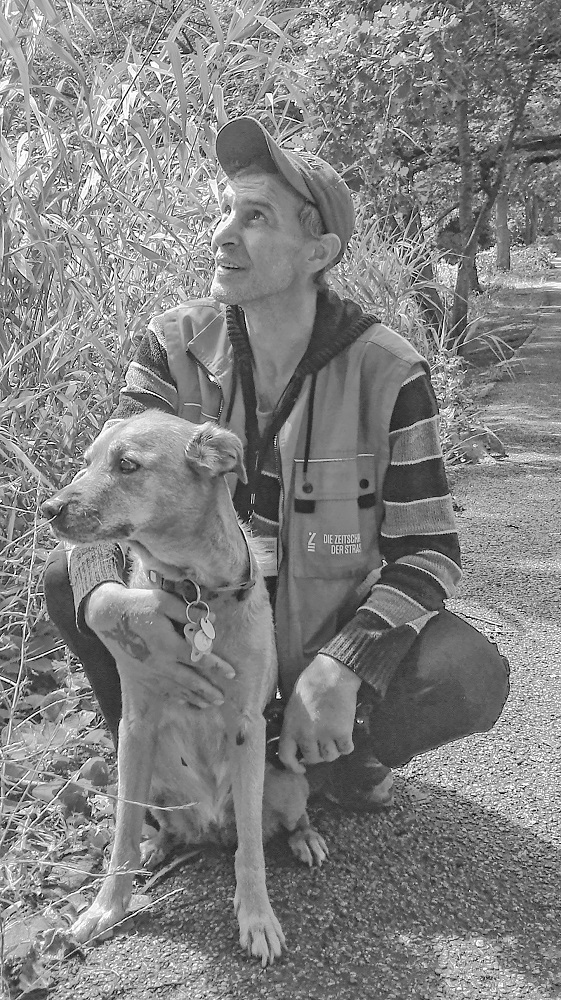By Eva Przybyla, Zeitschrift der Strasse
Not all of us know Pauli, but we do know his dog – Laika. The 14-year-old mongrel, who has slightly greying fur around her mouth, is lying peacefully on a blanket in the sales office when I first meet her. She is lying next to Pauli’s hiking rucksack. He watches her the whole time that we talk to each other.
Pauli is wearing his trademark FC St. Pauli baseball cap. His left hand looks swollen. This is a result of using heroin, he tells me: “that’s from the crap in the drugs”. The substance used to thin out the heroin has got into his veins and could end up blocking them. But Pauli is optimistic nevertheless: everything used to be a great deal worse.
It began with his family. His father was a violent pimp who forced his mother into sex work until she set up her own brothel in Bremen. Pauli was the first of the eight children that she gave birth to, so he spent a lot of time in the brothel. He hates prostitution. “It’s human trafficking, as far as I’m concerned,” he says.
Pauli’s father also used to beat him. Perhaps that’s the reason why Pauli had an alcohol problem by the time he was 13. He left school early, but then there was a glimmer of hope: he moved with his mother to the United States so that they could try their luck there. Although she left New Mexico fairly soon afterwards, Pauli – then aged 17 – stayed with a local family in Santa Fe. Pauli stopped drinking alcohol and graduated from high school. He did all of that with the help of meditation. “I can get quite high with meditation,” he tells me. “I focus on white positive energy and try to push everything negative out of my body.” He was even able to walk barefoot over hot coals while he was in this deep, meditative state.
When Pauli tried to show his friends at the Werdersee park, however, he badly burned both his feet. “Maybe it was because I was plastered,” he shrugs. He was back in Bremen. Back then, he was 19, a punk, a drinker and living in a workman’s hut. It was only four years later that he met his girlfriend and gave up alcohol. For good.

In partnership with his girlfriend and with a loan from his mother, Pauli opened The Radish – a vegetarian restaurant located at Bremen’s main station. The restaurant was going well, and so was his relationship: the pair were expecting a child in 2000. But when the baby suddenly died in hospital, the relationship broke down. Pauli gave up the restaurant and became homeless. Instead of drinking, he turned to heroin. He fell off the radar for a number of years. Pauli then became one of Zeitschrift der Strasse’s original vendors. At first, he sold the occasional issue, and, in the end, he was selling every single issue. “People like buying magazines in parks,” he says.
Pauli had four dogs before Laika. But Laika was the one who motivated him to try to kick his substance abuse issues. That was back in 2014. At the time, Pauli thought that if he couldn’t leave heroin alone on his own account, then he could at least do it for his dog. Now, Pauli is in a substitution treatment programme. He spends his nights sometimes sleeping at the freight depot and sometimes in a room. Independence is important to him. Independence from his mother is especially important, as she often puts pressure on him through the help that she wants to give him.
Pauli would rather help himself. He advises other homeless people to go through life at their own pace and encourages them to share begging and vendor spots from day to day. His own pitch is in Findorff, where it’s mostly lonely old people who stop to talk to him. “They’ve got less than me,” he says. Pauli’s advice for the homeless? They should apply for housing benefit and go to the Bremer Tafel foodbank.
Laika is suddenly restless and she wants to go outside. Without a moment’s hesitation, Pauli grabs her blanket, puts his rucksack on his back and follows her out.
Translated from German by Sean Morris




















